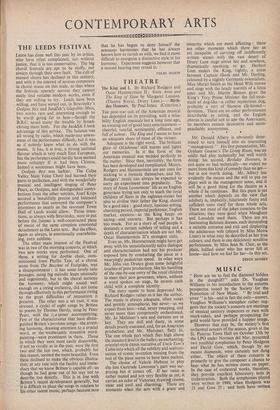CONTEMPORARY ARTS
THE LEEDS FESTIVAL
LEEDS has done well this year by its critics, who have often complained, not without justice, that it is too conservative. The big choral festivals are apt to be sniffy, not always through their own fault. The cult of massed choirs has declined in this century, and with it the interest of serious composers in choral music on this scale, so that where the festivals sparsely survive they cannot easily find suitable modern works, even if they are willing to try. Leeds have been willing, and have sorted out, in Stravinsky's Oedipus Rex and JanZek's Glagolitic Mass, two works rare and interesting enough to be worth going far to hear—though the B.B.C. saved many the trouble by broad- casting them both. For the Jandeek I took advantage of this service. The balance was all wrong by radio, which made-any assess- ment of the performance difficult, but it was as if nobody knew what to do with the music. It has, it is true, a strong national flavour which is very much East European, but the performers could hardly have seemed more unhappy if it had been Chinese. Indeed it sometimes Might have been.
Oedipus Rex was luckier. The Colne Valley Male Voice Choir had learned their parts to perfection, and with the wonderfully musical and intelligent singing of Peter Pears, as Oedipus, and distinguished contri- butions from the other soloists, Josef Krips secured a beautifully precise and balanced performance that conveyed the composer's intentions as nearly as the resonant Town Hall of Leeds would allow. Those inten- tions, as always with Stravinsky, were to put before the listener a well-constructed piece of music of the same complete emotional detachment as the Latin text. But the effect, again as always, is emotionally overwhelm- ing, even sublime.
The other main interest of the Festival was in two of the morning concerts; at which two new works were performed. One of these, a setting for double choir, com- missioned from Phyllis Tate, of a choral scene from The Bacchae of Euripides, was a disappointment : it has some lovely solo passages, using big melodic leaps unusually and ingeniously, but in the choral sections the harmony, which might sound well enough on a string orchestra, did not tome through.effectively in this performance owing to the great difficulties of intonation it presents. The other was a set (not, it was stressed, a cycle) of eight songs by Britten to poems by Thomas Hardy, sung by Peter Pears, with the ctiaposer accompanying. Few of the characterostics that have distin- guished Britten's previous songs—the arrest-• ing harmony, drawing attention to a crucial word, or the 'exuberantly inventive word- painting—were prominent in them. Those in which they were most easily discernible, if not so vividly as in the past, were the first two and the last two, which, probably for this reason, seemed the most beautiful. Even these declined to make the obvious illustra- tion; at any rate with the facility and imme- diacy that we know Britten is capable of—as though he had gone out of his way not to describe too directly. This is in line with Britten's recent development generally, but it is difficult to place the songs in relation to his other recent music, perhaps because now that he has begun to deny himself the sensuous harmonies that he has always known how to ravish us with, we find it more difficult to recognise a distinctive style in his harmony. Experience suggests however that a second hearing may reveal it. l•
COLIN MASON


































 Previous page
Previous page